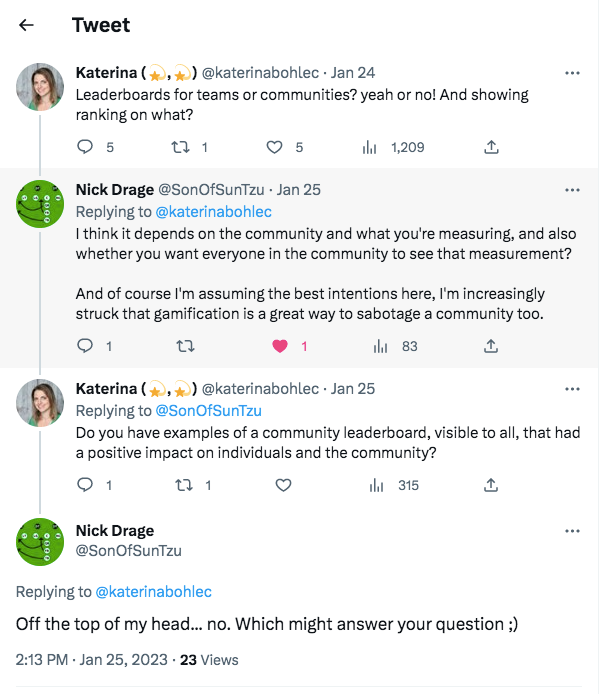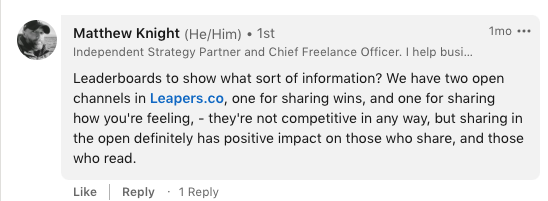Leaderboards or Pinboards?
Leaderboards or pinboards for teams and communities? Are they really useful?
This was originally only shared as an email update.
I turned to my favorite focus tool, Workfrom, got excited about their focus session feature, and pressed play on my playlist. So here it goes 1 hour to write a newsletter issue on the benefits of leaderboards.

Some might know that I wanted to write about leaderboards and their function and value in communities. This question was triggered by a work event. My team discussed whether our community health dashboard should have a leaderboard of the most active and inactive members, a way to rank people.
I've asked around for good examples of leaderboards. While Twitter didn't help much, LinkedIn sparked inspiration (thank you Matthew Knight): If you want competition, use leaderboards. If your goal is collaboration, use pinboards.

Pinboards have no ranking. They do not sort individuals but only display them. On the other hand, leaderboards force people to be evaluated on a dimension or a couple of dimensions. Leaderboards create the impression that it's a zero-sum game: You are either at the top or not. And if you are not at the top, you are not vital for the community or team. You are part of the invisible masses.

I read one exciting piece of research about leaderboards and open-source software (OSS). The open and permissionless nature of open-source software makes it accessible: Everyone can join and work on a project. But people, when they enter the OSS space, do not have any reputation. They start with nothing and must contribute to projects to gain a reputation. Those who want to create OSS need to assemble a reputable team and hence will not turn to those with no reputation: The beginners.
To grow into the shoes of a reputable developer, people have to work with different people. Now, this is where it gets tricky. People, also developers, strategically select with whom to work. Working with a novice typically means slower progress, less-than-ideal decisions, etc.
Understandably, developers with experience prefer working with others with similar experience levels, i.e., reputation. Can't blame them. That leaves those with low reputation levels with a problem: They need to contribute to projects to gain a reputation, but reputable developers aren't too keen on them joining their projects.
In such a situation, if you want to gain a reputation, your only option is to start and contribute where possible. Showcase what you have done, and slowly make it to the leaderboard. Of course, always try to collaborate with the top experts, but they might not even notice you. Go for the 2nd or 10th best.
In this example of OSS programs, humans still make decisions based on a ranking of people. But imagine if a program makes a decision based on your profile. This could be anything from sending you a DM to ask if all is ok as you haven't logged in for a while to banning (i.e., firing) you from a community due to your inactivity, posts, or being reported by others.
To round this up, I'm still undecided on the value of boards. If the aim is to coordinate actions, collaborate, and move towards a shared goal, then leaderboards can create unnecessary competition between members. In addition, they can also increase the trenches between the top, most prolific people, and the large anonymous masses.
If you read this, thank you! I spent a lot of time thinking about this topic but felt I made no progress. Happy to hear your thoughts!
Maybe I should have just asked ChatGPT ...